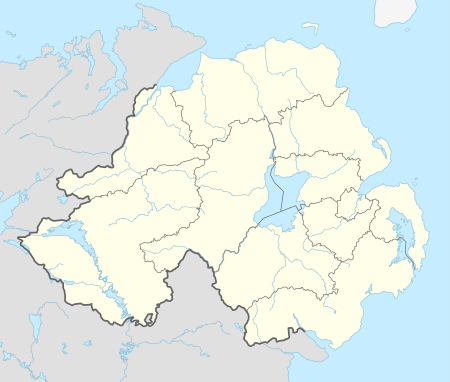Clogherbog
Coordinates: 54°20′56″N 7°47′46″W / 54.349°N 7.796°W
Clogherbog is a townland in County Fermanagh, Northern Ireland. It is part of the civil parish of Boho, and contains the sub-townlands of Carrickrory, Lough Nacloyduff, Loughanquin, Loughnamanfin and Tullylaur.[1] It is situated within Fermanagh and Omagh district.
The area is notable for the discovered remnants of ancient civilisations, including an Iron Age wooden cauldron[2] and the lettered cave at Lough Nacloyduff (the lake of the dark caverns), which contains primitive inscriptions.[1] The origins of this cave have been speculated on since a visit by William Wakeman in 1850.[3][4]
Other features include the Mass rock which is inscribed with the date of 1777 and the Lake of the Fair Woman (Irish: Loch na mban fionn) which is the subject of an old tale.[1]
See also
References
- 1 2 3 Boho Heritage Organisation (2009). Edel Bannon, Louise Mclaughlin, Cecilia Flanagan, eds. Boho Heritage: A treasure trove of history and lore. Nicholson & Bass Ltd, Mallusk, Northern Ireland. p. 246. ISBN 978-0-9560607-0-9.
- ↑ Lanigan Wood, H. (2003). Prehistory of Fermanagh: stone-age hunters to saints and scholars. Enniskillen: Fermanagh District Council. ISBN 0-9540727-1-5.
- ↑ Wakeman, William F. (1870). Lough Erne, Enniskillen, Belleek, Ballyshannon, and Bundoran: with Routes from Dublin to Enniskillen and Bundoran, by Rail or Steamboat. Dublin: Mullany, John. p. 125. Retrieved 12 December 2011.
- ↑ Wakeman, William Francis (1869). "On the inscribed cavern at Lough Nacloyduff, Parish of Bohoe, Co. Fermanagh. With 1 plate". Proceedings of the Royal Irish Academy. 1. X: 327–329.
